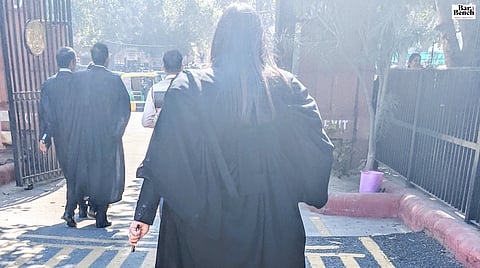
- Latest Legal News
- News
- Dealstreet
- Viewpoint
- Columns
- Interviews
- Law School
- Legal Jobs
- हिंदी
- ಕನ್ನಡ

Justice Leila Seth, in her autobiography On Balance, gives a delightful insight into her life journey and many intriguing as well as poignant court anecdotes.
One such incident depicts how there were only two female advocates, including herself, in the Patna High Court when she started practising at the end of 1958. There was no proper women’s toilet and a musty storeroom infested with bats was allotted for this purpose. In another incident, when she got an accused who was sentenced to ten years' rigorous imprisonment acquitted in a dacoity appeal, the litigant while expressing his gratitude addressed her as "Leila Babu" as if she were a man.
This form of address reflects how unprepared our society was back then to accept women in influential and critical roles, especially in that of a defender. Though it can’t be emphasized enough how far we have come as a society, long-standing gender asymmetries and their manifestations in common parlance still painfully and eminently exist.
Despite the passage of several decades, the language has failed us. In fact, in a fairly recent incident, Justice Rekha Palli of the Delhi High Court was constantly referred to as 'Sir'. Eventually, the judge said,
"I am not Sir. I hope you can make that out..."
In response, the lawyer said,
"Sorry, it's because of the chair you are sitting in".
Along with many other lawyers present in the court, I was taken aback, but felt a sense of respite when the judge retorted and said,
"Then that's even worse if after all this time you think that the chair is for sirs. If the younger members don't stop differentiating, then what hope do we have for the future?"
One could overlook this entire exchange by saying that humans are largely creatures of habit. But this habit is unfair towards women, who are made to feel that they still don’t belong where it matters. Apart from striving for equal opportunities, gender inclusiveness also demands language inclusiveness. This aspect has remained largely unimplemented in general public discourse, and even in our legislation. One such aspect of concealed gender neutrality is the usage of words like ‘chairman’, ‘man-hour’, ‘man-made’, ‘workmen’, ‘serviceman’ etc. Experiencing such things in the professional industry without the support of legislation is distressing.
Using words that even unwittingly exclude women or any other gender type in our pleadings or at the time of a court hearing is biased and discriminatory. As lawyers, we are trained to closely examine even the positioning of a comma. So it is rather rueful to overlook the usage of gender descriptive words that simply alienate a large population of this country on the lame pretext that it is a generic usage and the reader knows its application.
Language symbolises the sets of thoughts and points of view that a person or a country harbours. Therefore, even the unintentional use of such language perpetuates inequality. Let's make a conscious effort to refrain from the usage of gender-exclusive language, with the hope that soon the law will take its course in terms of a reflection of society's values, which are made by WE, THE PEOPLE OF INDIA.
Tanu Priya Gupta is an Advocate-on-Record, Supreme Court of India.